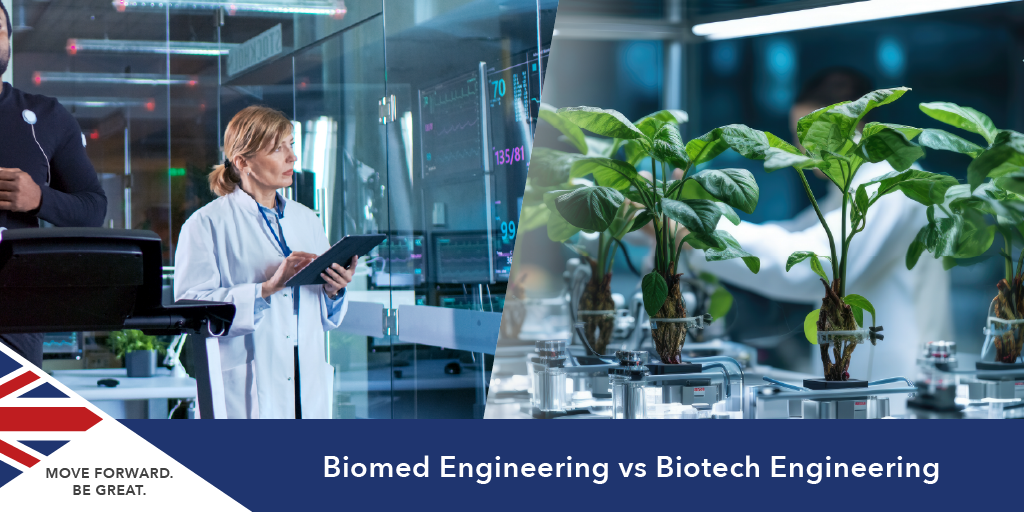Biomedical engineering and biotechnology engineering are diverse fields of study for students who do not want to study a typical medical science degree, and both of these fields of study highlight various untapped aspects of biology.
So, what exactly is biotech engineering? The biotechnology sector includes food, medicine, agriculture, and plants, whilst biomedical engineering utilises engineering applications that are solely for the medical and healthcare fields.
Biotech engineering and biomedical engineering are two different fields that use engineering applications. Learn more below and if you want to apply, contact SI-UK today for a free counselling on your future.
Biotechnology vs Biomedical Engineering
Biotechnology
Biotechnology degrees focus on the application of biological principles to develop products, processes, and technologies for sectors like agriculture, medicine, and environmental management. The curriculum usually includes foundational coursework in biology, genetics, microbiology, and biochemistry with applications in genetic engineering, molecular biology, and bioinformatics. Students often specialise in areas like plant or microbial biotechnology, bioinformatics, or pharmaceutical biotechnology.
- Key Subjects: Biochemistry, genetic engineering, molecular biology, microbiology, biostatistics
- Lab Work: Extensive laboratory and field research are central, with a focus on developing biological products and processes.
- Skills Developed: Knowledge in genetics, bio-manufacturing techniques, and data analysis
Career Prospects
Biotechnology careers are diverse and often focus on product development and research in healthcare, agriculture, and environmental protection.
- Pharmaceutical and Biotech Companies: Developing drugs, vaccines, and medical devices
- Agricultural Firms: Improving crop yields and creating pest-resistant strains
- Environmental Organizations: Working on bioremediation and waste management solutions
- Research Institutes: Focusing on academic and applied research in genetics and microbiology
Biotechnologists typically work as research scientists, lab technicians, bio-manufacturing specialists, or regulatory affairs managers. The field has a strong emphasis on lab-based research, requiring in-depth knowledge of cellular and molecular processes.
Biomedical Engineering
Biomedical Engineering degrees blend engineering principles with biological sciences to create technologies that support healthcare, such as diagnostic devices and therapeutic tools. The coursework is engineering-centric, covering mechanical, electrical, and chemical engineering along with human physiology and medical instrumentation.
- Key Subjects: Engineering mechanics, biomaterials, medical imaging, biomechanics, and systems physiology
- Lab and Field Work: Focus on design and innovation in healthcare devices and systems
- Skills Developed: Skills in product design, medical device development, and clinical problem-solving
Career Prospects
Biomedical engineering careers focus more on the design, development, and maintenance of medical devices and healthcare technologies, including work in research, clinical environments, and product development.
- Medical Device Companies: Designing and testing devices like prosthetics, imaging tools, and pacemakers
- Hospitals and Clinical Settings: Ensuring medical equipment is maintained and functional
- Research and Development: Conducting studies on biomechanics, tissue engineering, and medical robotics
- Regulatory Roles: Ensuring products meet health and safety standards
Common roles include biomedical engineers, clinical engineers, quality assurance specialists, and R&D engineers. The field combines engineering problem-solving with a healthcare focus, emphasizing device safety, effectiveness, and compliance with regulatory standards.
Differences between Biotechnology and Biomedical Engineering
-
Scope of Work: Biotechnology is more focused on biological processes and their applications across various industries, while Biomedical Engineering is largely engineering-based with an emphasis on healthcare solutions.
-
Job Settings: Biotechnologists often work in labs and research facilities, whereas biomedical engineers are more likely to work in hospitals, clinics, and manufacturing environments.
-
Technical Skills: Biotechnology requires a strong understanding of genetics and microbiology, while Biomedical Engineering leans toward applied engineering skills, including computer-aided design and medical imaging technologies.
While both fields aim to improve human life, Biotechnology is deeply rooted in biological sciences with applications across various industries, and Biomedical Engineering is primarily an engineering field focused on healthcare innovation.
These fields have substantial overlap in biomedicine, but choosing one depends on whether a student prefers a biological science pathway (Biotechnology) or an engineering pathway with a medical focus (Biomedical Engineering).
Eligibility Criteria and Entry Requirements
Biotechnology Entry Requirements
An applicant requires a score of 80% in their high school, and physics, chemistry, biology, or mathematics are also studied. For the postgraduate level, the applicant must have a bachelor’s degree in subjects such as biochemistry and microbiology.
You must show valid English language scores, your education certificates, transcripts, letters of reference, and other related documents. The minimum requirement for these test scores varies for each university.
Biomedical Entry Requirements
For biomedical engineering admission, the applicant must have Biology, Physics or Chemistry as their preferred subject at the high school level. For postgraduate programmes, the applicant must hold a bachelor’s degree in subjects such as life sciences.
Apart from this, valid English language scores in any recognized and accepted test are required to show expertise in the language. Documents like a transcript, education certificates and personal statements must be submitted along with the application.
Biotechnology and Biomedical Course Fees
The average cost of studying for a postgraduate degree in biotech engineering in the UK can be around £23,000 per year. However, it can go higher depending on the university you are applying to. Biomedical engineering at an undergraduate level can cost £13,000 per academic year; for postgraduate degrees, the price can go up to £14,000.
Study Biotech Engineering or Biomed Engineering
If you want to study biotech engineering or biomed engineering in the UK, arrange your free consultation with SI-UK in Delhi, Mumbai, Bangalore, Pune, Chennai and Coimbatore today.
FAQs
Biomedical engineering is based on the engineering principles of biology and medicine, along with a distinctly multidisciplinary approach. On the other hand, biotechnology is based on biological science with a focus on chemistry.
No, you cannot become a biomedical engineer with a biotechnology degree. To become a biomedical engineer, you need a degree in biomedical engineering.
No. Maths is an integral part of biomedical engineering.
Biomedical engineering and pharmacy are close disciplines, but they cannot be compared as both focus on the different stages of the health spectrum.
No, biological science and biotechnology are not the same.




 I sincerely thank SI-UK for getting me accepted to UCL. The MSc in Urban Development and Planning is extremely competitive, but the right guidance provided by SI-UK made my dream of studying at University College London a reality. The services were exceptional from beginning to end.
I sincerely thank SI-UK for getting me accepted to UCL. The MSc in Urban Development and Planning is extremely competitive, but the right guidance provided by SI-UK made my dream of studying at University College London a reality. The services were exceptional from beginning to end. 

